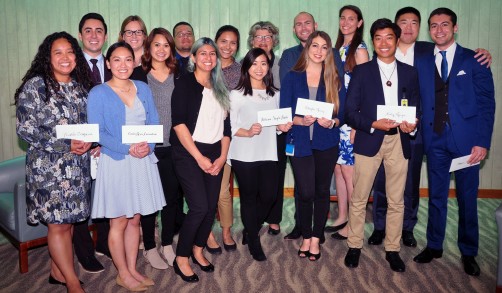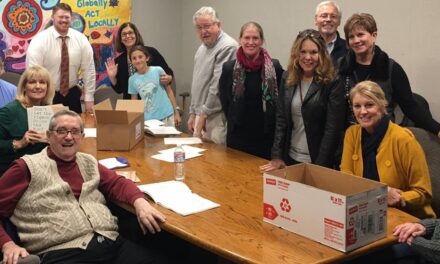
Dean Mary Walshok awards 15 scholarships to students in the UC San Diego Extension Clinical Laboratory Scientist Training Program.
SAN DIEGO–(Newswise)–As a former clinical laboratory scientist (CLS) student, Melissa Dull knew she wanted to financially help other students achieve their goals in pursuing careers in the medical technologist and laboratory fields. And, before her passing in 2017, she donated $100,000 to the UC San Diego Extension Clinical Laboratory Scientist Program.
For the second year in a row, her donation has provided a $1,500 stipend to 15 students of the UC San Diego Extension CLS Training Program.
Dull was a licensed clinical laboratory scientist (also called medical technologist or medical laboratory scientist) for 37 years who during her career worked at Rady Children’s Hospital, Grossmont Hospital and a private laboratory before accepting a position as a microbiologist with the Naval Medical Center San Diego. She found her true calling in teaching and encouraged colleagues to complete their education and get their CLS license. Due to her illness, Dull retired in 2016 and established the Melissa Dull Current Use Fund for CLS Program Support to encourage future clinical laboratory scientists in the profession she loved.
At a reception on May 30, 2018, Mary Walshok, dean of UC San Diego Extension, and Dull’s long-time friend and CLS program coordinator, Barbara Sevilla, distributed checks to 15 students who demonstrated success in the first six months of this year’s CLS program.
“Melissa hoped that this donation would ease the financial stress for students and help promote the profession she loved,” said Sevilla. “It was her wish that scholarships would encourage more people to consider becoming clinical laboratory scientists as they are vital to the healthcare team in its commitment to the public.”
Since the start of the UC San Diego Extension CLS program in 2005, 90 students have graduated and started careers as clinical laboratory scientists. Sevilla said this class of 15 students is one of the largest to date and hopes that the financial assistance will provide some relief for students during a very rigorous training year.
“Currently there is a shortage of qualified laboratory personnel and as the Baby Boomer population ages there will be a greater need for students with technical skills who will become qualified, competent professionals that aid in the diagnoses, treatment and monitoring of medical conditions,” said Walshok.
According to the Bureau of Labor Statistics, employment of medical and clinical laboratory technologists and technicians is expected to grow 13 percent by 2026, faster than the average for all occupations.
“Because of this demand, Sharp, Scripps and UC San Diego pay the tuition of the participants in UC San Diego Extension’s CLS program,” said Sevilla. “Still, the program is a full-time commitment, which makes it nearly impossible for those in the program to earn a living.”
Octavio Rincon, a current student of the CLS program and stipend recipient, expressed gratitude in receiving financial assistance from the Melissa Dull Current Use Fund.
“This means a lot because as a student I haven’t worked much thus far so this is actually a great help,” said Rincon. “I really appreciate what we’re receiving and after I graduate I want to start working in the general lab then find a specialization down the line.”
It was Dull’s wish that others donate to the fund to perpetuate additional resources for future CLS students. Donations should be sent to the UC San Diego Foundation – Melissa Dull Fund, attention Kim Wenrick, University Development, 9500 Gilman Drive #0937, La Jolla, CA 92093-0937.



